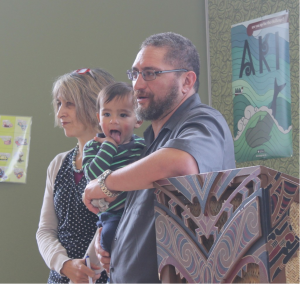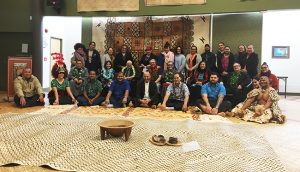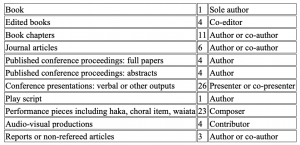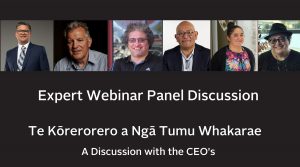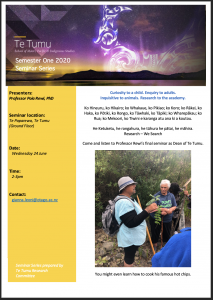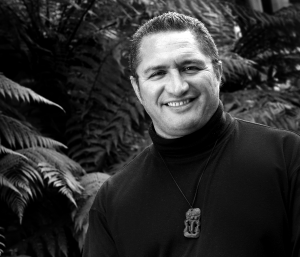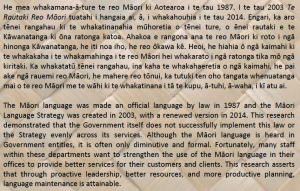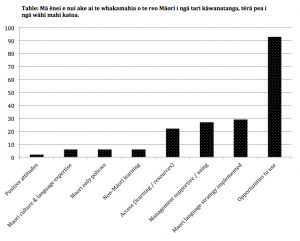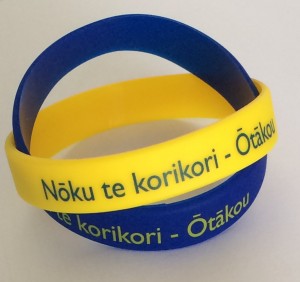Te Tumu’s First Professor Emeritus
Poia Rewi (Ngāti Manawa, Tūhoe, Te Arawa, Ngāti Whare and Tūwharetoa) was appointed as a Senior Lecturer in Te Tumu, School of Māori, Pacific and Indigenous Studies at the University of Otago in 2003. Previously he had been a Māori Studies academic at the University of Waikato from 1992. In 2016 he was promoted to professor. He ended his service at Te Tumu in mid-2020 in July 2020 when he took up the role of Chief Executive/Tumu Whakarae of Te Mātāwai, a government organisation established under Te Ture mō Te Reo Māori 2016/The Māori Language Act 2016, to foster and support Māori language development for iwi.
Although the honour of professor emeritus is normally awarded to professors retiring from academia, the University’s Policy for the Award of the Title of Emeritus Professor allows the title to be made to a Professor who resigns, for example, to take up a distinguished public position. Poia’s illustrious academic career (discussed below) and his leadership within Te Tumu and the university induced Professor Michael Reilly and other Te Tumu colleagues to seek this honour for our recently departed Dean.
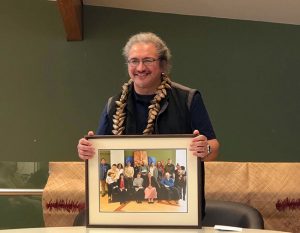
Professor Poia Rewi at his farewell at Te Tumu, 24 June 2020, with a photo featuring his Te Tumu colleagues.
Speaking to the Otago Bulletin Board on Poia’s departure in July last year, Professor Reilly described Poia as a “deeply humble, modest man who believes that it is for others to speak of the kumara’s sweetness.”
“His abiding passion is always first and last, te reo Māori. He advocates for its use by all New Zealanders. In his teaching and writing he always encourages his students and others to seek out and to utilise the rich diversity of language forms that the reo has inherited from the ancestors.”
“In Te Tumu Poia was generous with his time and showed hospitality to all. He became well known for volunteering to work in the kitchen, always concerned to ensure visitors, staff and students had plenty of food; a mark of the true leader, one who always thought of the well-being of others.”
Poia places much value on the importance of teaching the new generation, and work within the community. The growing success of his postgraduate students attests to his influence, and in 2012 he received the Otago University Students’ Association Supervisor of the Year Award. His knowledge of the reo and Māori performing arts resulted in him being appointed a judge at many regional Māori-language speaking competitions as well as being a judge at national, regional and tribal Māori performing arts competitions (adult/senior and high school levels).
Te Reo Māori has always been his passion. In 1997 he received a certificate as a translator and interpreter of te reo Māori from Te Taura Whiri i Te Reo Māori/The Māori Language Commission. This is an exceedingly hard qualification to attain and demonstrates his high level of proficiency in the Māori language. In 2005 Poia completed the first PhD solely in Te Reo Māori at the University of Otago. It was a study of whaikōrero or Māori oratory through the words of a group of some 30 respected elders, many of them highly regarded orators on the marae throughout the country.
Subsequently, he revised and translated the thesis into English for publication as Whaikōrero: The World of Māori Oratory, published by Auckland University Press in 2010. This book was the first major publication to study this major Māori art form. In 2011 it was awarded the New Zealand Society of Authors – E. H. McCormick Best First Book Award for Non-Fiction. Later, it became the basis for a 12 part Māori Television documentary, ‘Whaikōrero’, which won the Broadcasting-Māori medium category in Ngā Tohu Reo Māori 2014/the Māori Language Awards 2014.
As a researcher his dominant focus has been Te Reo Māori and the associated performing arts. As a teacher of the reo to second language learners he has always been interested in the revitalisation of the reo and this became the centre of his research in more recent years. In 2010 he was a lead investigator for two major grants from Ngā Pae o te Māramatanga, a national Centre of Excellence: ‘He Iho Reo, Developing a toolbox to support Māori Language Transmission and Maintenance’ ($226,439), and ‘Te Pae Tawhiti: “Te Kura Roa,”’ a jointly commissioned research project with Rāwinia Higgins of Victoria University of Wellington ($1,500,000). A number of reports and publications were generated from these grants including
- Day, D & Rewi, P., ‘Te Kura Roa wānanga wawata: Inter-department Specific- enablers/inhibitors’, 2013. Twelve individualised reports distributed to each of the 12 participating Government departments, approximately 667 pages.
- Higgins, R., Rewi, P., Olsen–Reeder, V. (eds.), The Value of the Māori Language: Te Hua O Te Reo Māori, Wellington: Huia Publishers, 2014,
- Day, D., Rewi, P. & Higgins, R. (eds.), The Journeys of Besieged Languages, Newcastle upon Tyne, UK: Cambridge Scholars Publishing, 2016.
Further to his academic pursuits, Poia has been a prolific writer of Māori narrative over the years manifesting in published works as haka compositions, waiata, Māori language plays, fiction and nonfiction. This has resulted in several texts published in the Pikihuia short stories series. Poia himself has also adjudicated the Pikihuia Māori writers’ awards for a number of years. His most recent writing accolade was acknowledged in 2020 for a te reo Māori text.
Poia has completed 86 outputs, as shown in the summary on the left.
Poia served as Dean of Te Tumu between 2015 and 2020. Another significant leadership role at Otago was as Associate Dean Māori, Division of Humanities, 2012-2014. He was also Deputy Director of Ngā Pae o te Māramatanga, a national Centre of Research Excellence, between 2018-2020.
His recognition as a leader in the Māori world was evidenced by his service as Acting Chief Executive of Te Taura Whiri i Te Reo Māori/The Māori Language Commission from 2014-2015. He was also a member of the Commission’s Board between 2012-2015. This outstanding service within, but also outside the university, helped pave the way to his new role at Te Mātāwai. Poia was elected in 2021 as a Fellow of the Royal Society of New Zealand Te Apārangi, “celebrated as one of the most active research specialists in Māori culture, language revitalisation, oral history and performing arts.” Yet, due to his modesty, even some of his Te Tumu colleagues had no idea of the extent of his scholarship.
Poia Rewi always said when he first came down to Otago 18 years ago he had only wanted to stay for a few years before heading back up to the North Island. We knew that he was only on loan to us, and it was an honour to have him for the time that that we did. E hoa, me kore ake koe hei ārahi i a mātou, arā, i ō hoa mahi o Te Tumu me te whare wānanga, i te ao Māori kei waho o te whare wānanga, me ngā tini tāngata e kimi ana, e whakaū ana, e whakapiki ana i te reo Māori.
[Thanks to Professor Michael Reilly and Dr Tangiwai Rewi for information for this post.]
Webinar with leading Māori CEOs.
Do you want to listen to listen to some inspiring Māori leaders? Join a webinar hosted by Te Tumu’s Dr Tangiwai Rewi and Dr Gianna Leoni, on behalf of Ngā Pae o te Māramatanga on Friday, 18 September at 2pm. You will hear the words of wisdom from the following CEOs: Shane Taurima (Māori Television), Larry Parr (Te Māngai Pāho), Ngahiwi Apanui (Te Taura Whiri i te Reo Māori) and Dr Poia Rewi (Te Mātāwai). Click here for more info and to register.
Poia’s last seminar as Dean of Te Tumu
Professor Poia Rewi will be giving his last ever seminar to Te Tumu as Dean of our School. Poia has been an inspiring leader of Te Tumu and, as most of you know, we are very sad that he will soon be leaving the university for greener pastures elsewhere.
It would be wonderful if you are able to come along to the seminar; if not, then his talk will also be live-streamed on Te Tumu’s Facebook page.
Poia Rewi (Ngāti Manawa, Tūhoe, Te Arawa, Ngāti Whare and Tūwharetoa) hails from Murupara in the Bay of Plenty. He migrated south from Waikato University to Te Tumu, the University of Otago’s School of Māori, Pacific and Indigenous Studies in 2003 to help boost our Māori-language teaching programme. He is an acknowledged master of te reo Māori, always teaching the advanced-level language classes. A noted composer in his own right, he also taught Te Tumu’s advanced kapa haka classes. Poia completed his PhD in 2005, written completely in te reo Māori.
He has always been popular with students as a teacher and supervisor, as willing to feed their bellies with his soups as their minds with his knowledge. He became the Dean of Te Tumu and full professor in 2016.
Poia is also a serious and respected researcher, with publications on te reo Māori, language revitalisation, tikanga Māori, Māori oratory and Māori history. Indeed his thesis, published in 2010 as Whaikōrero: The World of Māori Oratory by Auckland University Press, went on to win the Best First Book Non-Fiction Award in the 2011 New Zealand Book Awards.
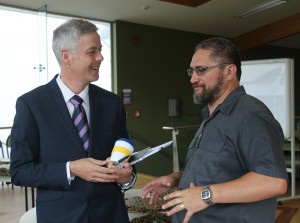
Professor Poia Rewi with DVC (Research and Enterprise) Professor Richard Blaikie at the launch of AKI.
Poia has always been a great innovator and collaborator. He helped develop AKI, an app to help learn Māori vocabulary with other Otago academics. He is also part of the team that came up with ZePA (Zero Passive Active), a model to advance the public’s attitudes and engagement with te reo Māori, and to promote Māori-language revitalisation, that is now used by a number of government agencies. Recently, Poia has worked with academics at Victoria and Auckland as a Co-Principal Investigator of Te Pae Tawhiti: Te Reo Māori, funded by Ngā Pae o te Māramatanga, looking at the value of te reo Māori in terms of the economy, cultural identity and social cohesion. This led to The Value of the Māori language: Te Hua o te Reo Māori, published by Huia in 2014, that won the Te Reo Māori category of Ngā Kupu Ora Aotearoa Māori Book Awards in 2015. Poia is currently Deputy Director of Ngā Pae o te Māramatanga, a position he will reluctantly have to leave behind for his new role in Wellington.
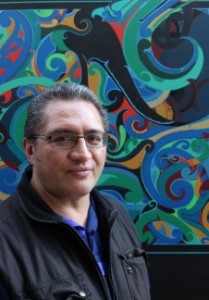 The revitalisation and advancement of te reo Māori have always been Poia’s passions. He was appointed to the board of Te Taura Whiri i te Reo Māori (Māori Language Commission) in 2012, and in 2014 was seconded from the university to be their acting Chief Executive. Poia’s new role, starting next month, is also in a similar field, as Tumu Whakarae (Chief Executive) of Te Mātāwai, a government agency created to assist hapū, iwi and communities in the important task of Māori-language revitalisation.
The revitalisation and advancement of te reo Māori have always been Poia’s passions. He was appointed to the board of Te Taura Whiri i te Reo Māori (Māori Language Commission) in 2012, and in 2014 was seconded from the university to be their acting Chief Executive. Poia’s new role, starting next month, is also in a similar field, as Tumu Whakarae (Chief Executive) of Te Mātāwai, a government agency created to assist hapū, iwi and communities in the important task of Māori-language revitalisation.
Our loss will be the community’s gain. Poia has been an amazing example for us in Te Tumu and the University of Otago, as a person who lives and breathes tikanga Māori, as an inspirational teacher, a leader in research, as well as a colleague and friend in the academy. We will surely miss him.
The Journeys of Besieged Languages
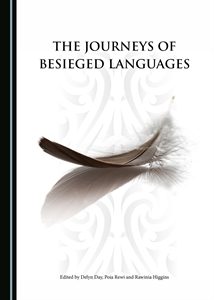 Kāore te kumara e kōrero ana mo tōna ake reka (the kumara never talks of its own sweetness), and Professor Poia Rewi has been humble as usual about his latest publishing success. Arising out of the Te Kura Roa: Minority Language & Dialect Conference held at Otago in 2015, Poia co-edited a new book, The Journeys of Besieged Languages, published by Cambridge Scholars Publishing. His co-editors include Dr Delyn Day, a PhD graduate from te Tumu, and Professor Rāwinia Higgins, a former staff member now at Victoria University of Wellington. Unlike the award-winning, The Value of the Māori Language: Te Hua o Te Reo Māori, (also co-edited by Poia and Rawinia), The Journeys of Besieged Languages focuses on endangered languages from around the world, from New Zealand, the Pacific, Australia, North America, Europe, Greenland, and Israel. Koia kei a koutou, Poia mā.
Kāore te kumara e kōrero ana mo tōna ake reka (the kumara never talks of its own sweetness), and Professor Poia Rewi has been humble as usual about his latest publishing success. Arising out of the Te Kura Roa: Minority Language & Dialect Conference held at Otago in 2015, Poia co-edited a new book, The Journeys of Besieged Languages, published by Cambridge Scholars Publishing. His co-editors include Dr Delyn Day, a PhD graduate from te Tumu, and Professor Rāwinia Higgins, a former staff member now at Victoria University of Wellington. Unlike the award-winning, The Value of the Māori Language: Te Hua o Te Reo Māori, (also co-edited by Poia and Rawinia), The Journeys of Besieged Languages focuses on endangered languages from around the world, from New Zealand, the Pacific, Australia, North America, Europe, Greenland, and Israel. Koia kei a koutou, Poia mā.
He rongo
Aroha mai! A belated roundup of Te Tumu research news.
In July we were treated to Poia Rewi’s Inaugural Professorial Lecture, held to celebrate his ascension to this tūranga rangatira within the university. The title of his talk was “Hoka : Motivators of Time”, a tour alongside Poia as he recounted his own academic journey, and his ZePA model of developing positivity around the use of te reo Māori. This was well attended by Poia’s whānau, staff and students, as well as many from the community, and was capped off with haka, waiata and karakia. The lecture can now be viewed on ITunes U.
In July Te Tumu were privileged to host Professor Michael Harkin as a William Evans Fellow. Professor Harkin, a cultural anthropologist and inaugural editor of Ethnohistory, gave several talks: a public lecture “The Trump at the End of the World: Monsters and Marvels in our Parlous Age”, in which he brought his knowledge of societies past and present together, and a departmental seminar, “‘The Emotional Archive’: The case of Residential Schools in Canada”, in which he examined ‘the relative lack of negative narratives [he] elicited…during fieldwork in British Columbia in the 1980s–2000s’, while also exploring ‘various forms of social memory, proposing the notion of an “emotional archive” that contains non-narrative memory traces’.
It is always great when our students gain their postgraduate degrees, after months or years of working on, and writing up their research. We had three such students graduating this August: Sandra Spence (Pākehā) and Raaniera Te Whata (Ngāpuhi, Ngāti Porou, Te Whānau a Apanui, Airihi) with the Master of Indigenous Studies, and Gianna Leoni (Ngāti Kurī, Ngāti Takoto, Itariana) with a PhD.
Dr Lyn Carter supervised Sandra, whose research was on “Kāi Tahu Chinese Unions and Identity in Otago and Southland/Murihiku”; Associate Professor Merata Kāwharu supervised Rāniera (“Tautoro, tū te ao, tū te pō (The endurance of Tautoro heritage): Investigating challenges and opportunities”); Professor Poia Rewi and Associate Professor Lachy Paterson supervised Gianna (“Mā te Taki te Kāhui Ka Tau: Te Waiaro ki te Reo Māori i ngā Hinonga Kāwanatanga”) who wrote her thesis in te reo Māori. Gianna is teaching MAOR312: Te Māhuri 2 this semster.
Professor Poia Rewi – Staff Research Profile
 Ko Ahorangi Poia Rewi te Tumuaki o Te Tumu, engari, he whakahirahira hoki āna mahi rangahau kia ora ai te reo Māori. Ko ia hoki tētahi o ngā ētita o te pukapuka, The Value of the Māori Language: Te Hua o te Reo Māori (Huia Publishers).
Ko Ahorangi Poia Rewi te Tumuaki o Te Tumu, engari, he whakahirahira hoki āna mahi rangahau kia ora ai te reo Māori. Ko ia hoki tētahi o ngā ētita o te pukapuka, The Value of the Māori Language: Te Hua o te Reo Māori (Huia Publishers).
He uiui tēnei, he mea mahia mā runga īmēra.
Te Tumu: e te rangatira, tēnā koe. Ka harikoa te ngākau i tō whakaae kia uiuia mō tēnei putanga o tō tātou rangitaki (blog).
Nā, i tērā tau i whakatūria ai koe hei Tīni, arā hei tumuaki o Te Tumu, ā, i tēnei tau i whakaahorangitia koe. He mahi nunui pea ēnei tūranga hei hāpai i te reo Māori i roto i ngā akoranga o Te Tumu, i ngā mahi rangahau, i te whare wānanga hoki. Engari, ka whakapā tāku pātai tuatahi ki tō huarahi ki ēnei tūranga hou. I tō tamarikitanga me tō kuranga, he mea nui te reo Māori ki a koe? Ka aha koe ki te whare wānanga? Nā te aha koe i tahuri ai ki tō mahi hei pūkenga reo Māori? Ko wai ngā pūkenga e whai nei koe?
Poia Rewi: He roa pea te takahanga ki konei. Nā Hine-maringanui pea, nā ngā mana o ngā tīpuna pea, nā ngā pākeke mōhio pea ki te arataki, nā taku hapū ake hoki i runga i te mea, katoa rātou i whakawatea i a au i nga kawenga o te hapū i wātea ai au ki te whai i te ao mātauranga nei. Āpiti atu, ko ngā hoa mahi i roto i ngā whare wānanga e rua (otirā i ngā whare wānanga maha i ngā mahi rangahau) – nā ngā hoa mahi nei au i whakawātea, arā, ka pīkauhia e rātou ngā mahi akoako kia oti i a au ngā rangahau. Ko taku whakapae, nā te rangahau rawa i ū ai te piki tūranga ki uta.
Te Tumu: I tō tamarikitanga me tō kuranga, he mea nui te reo Māori ki a koe?
Poia Rewi: Ehara i te mea i noho motuhake te reo: i aro nui au ki ngā mea Māori (noho marae, mahi whānau, haere ki ngā huihui)
Te Tumu: Ka aha koe ki te whare wānanga?
Poia Rewi: Ko aku aronga nui i ēnei tau, 1) ko te whakapakari hoa mahi, 2), ko te whakapakari i ngā kaupapa akoako a Te Tumu, c) ko te whakapūmau me te whakatairanga i ngā mātauranga Māori, Pasifika , iwi taketake ki te Whare Wānanga o Otākou.
Te Tumu: Nā te aha koe i tahuri ai ki tō mahi hei pūkenga reo Māori?
Poia Rewi: i tīmata noa iho au hei kaiāwhina mā Te Haumihiata Mason i Waikato, koia taku whakamarumaru whakaako reo tuatahi, hua noa, ka hapū tētahi kaiako reo, ka riro māku e kawe, nā, kua pūkenga reo Māori.
Te Tumu: Ko wai ngā pūkenga e whai nei koe?
Poia Rewi: Kua whakahuatia e au a Te Haumihiata, arā atu ano a Te Wharehuia, a Hirini, a Tīmoti. Arā anō ngā pūkenga ā-iwi nei, i aku hapū, i aku iwi nui tonu.
Te Tumu: Kua tino mārama nei, he nui rawa atu tō aroha ki te reo Māori, ā, kei te pīrangi koe kia kōrerotia whānuitia te reo i roto i te hapori. He aha ōu wawata mō te reo?
Poia Rewi: kia nui ake te korerotia, kia tokomaha ake te hunga korero; mātua, koinā.
Te Tumu: Me aha kia tutuki ai?
Poia Rewi: Kia tangata whenua anō te reo i te whenua nei, kātahi ka tutuki.
Te Tumu: he huhua ngā momo kura onāianei e whakaako ana i te reo Māori, engari kei ngā whare wānanga ngā tini mahi rangahau. Whakamāramatia tō koutou hōtaka rangahau ko āu ākonga paerunga. He aha ngā painga e tūmanakohia ana? He aha ērā atu rangahau kāore anō kia meatia, engari kei te matea tonu?
Poia Rewi: ko Te Kura Roa te Kawenga Rangahau matua – he kaupapa nā māua ko Ahorangi Rawinia Higgins o Te Kawa A Māui. E mātua aro ana ki te hua o te reo Māori (ahakoa hapori, ahakoa tari kāwanatanga), Ko Te Kura Roa – Waiaro te wāhi ki Otākou, anā, ko tāna he titiro ki te waiaro o ngā tari kāwanatanga ki te reo Māori i Aotearoa. I Tīmata i 2011. Ko ngā kairangahau kua whai waahi ki tenei rangahau o Otākou nei, ko Dr Delyn Day, ko Gianna Leoni, ko Norma Bartlett, ko Merirangitiria Rewi, ko Julia Coates, ko Suzanne Duncan, ko Awhi Wakefield, ko Kelly-Ann Tahitahi, ko Tawini WHite, ko Raphael Richter-Gravier, ko Jacob Myhre, ko Victoria Campbell, ko Te Hau White, ko Marcelle Wharerau.
Ko ngā mātua kitenga o te rangahau rā, kia kura unua nei te whakarauora reo, arā, ko tā tētahi tētahi riu he titiro ki te whakapūmau i te oranga o te reo, ko tā tētahi, he he whai kia tipu te reo.
Te Tumu: He aha ngā painga e tūmanakohia ana?
Poia Rewi: kia whakahingāia mai ngā tari kāwanatanga, me te motu whānui o Aotearoa ka pai ake te waiaro ki te reo Māori.
Te Tumu: He aha ērā atu rangahau kāore anō kia meatia, engari kei te matea tonu?)
Poia Rewi: Kua nui pea nga rangahau, ko te tīni i te waiaro te mate nui. Hei ahakoa, ka whakamanatia te Pire Reo Māori ākuanei, tera pea koinā te rongoā ināhoki, ko tētahi o ngā tohutohu matua o te Pire, kia riro mā te iwi āna kaupapa mō te reo e kōkiri, ka mutu, ka mātua tophu Te Taura Whiri i te Reo Māori hei whai i te aro mai o ngā Tari Kāwanatanga ki te reo Māori. Kāore anō ngā tari kāwanatanga kia āta aro turukihia ā-hōmiromiro tonu nei. Koinā pea te mātua niho o te Pire Reo Māori ā taka iho ki te anamata.
Koia ēnei ngā mea e tautoko ana i te whakamahia o te reo Māori i ngā tari kāwanatanga:
Te Tumu: Kia ora, e hoa.
Nā, ā te Tāite, 14 Hōngongoi a Poia tū ai ki te kōrero mō ana mahi rangahau. Kō tāna Kauhau Ahorangi (Inaugural Professorial Lecture) tēnei. Hei te 5:30pm, Burns 2, kei te Whare Wānanga o Otākou. Haramai nei ki te whakarongo ki a ia.
ZePA research behind Māori language initiative at university
“Nōku te korikori” is a new initiative to help promote and normalise te reo Māori on campus, based on the ZePA model.
Developed by researchers Professor Poia Rewi, Dean of Te Tumu, and Professor Rāwinia Higgins (former Te Tumu staff member and now Head of School of Māori Studies at Victoria University), ZePA stands for Zero->Passive->Active, in which individuals might “right-shift” to a more active use of te reo Māori. The principles behind this model are explored in the book, The Value of the Māori Language: Ngā Hua o te Reo Māori.
“Nōku te korikori”, spear-headed by Tangiwai Rewi, the coordinator of Te Tumu’s Māori Studies programme, encourages learners and speakers of te reo Māori to don distinctive wristbands so that other learners and speakers can easily identify people who are receptive to a kōrero i roto i te reo rangatira. For full details check out this Otago Bulletin article.
“Testing te reo”
Check out Poia Rewi’s research on the revitalization of te reo Māori in this extended article in the latest issue of the Otago Bulletin.
Success at the Ngā Kupu Ora Book Awards
I te Rāmere nei i tū ai Ngā Kupu Ora Book Awards, ā kei Te Hua o Te Reo Māori te wini mō te paraihe Reo. He mea ētita tēnei pukapuka e Ahorangi Rāwinia Higgins (he kaiako ia nō Te Tumu i ngā rā o mua) rātou ko Ahorangi Tuarua Poia Rewi (koia te Tīni o Te Tumu ināianei) ko Vincent Olsen-Reeder.
The Ngā Kupu Ora Book Awards were held on Friday. The Value of the Māori Language: Te Hua o Te Reo Māori, co-edited by former Te Tumu staff member Associate Professor Rāwinia Higgins, current Te Tumu Dean Associate Professor Poia Rewi, and Vincent Olsen-Reeder, took out the Te Reo prize.
He pukapuka tēnei “that aims to engage and reawaken Māori consciousness on the value of Māori language won the Te Reo prize. The Value of the Māori Language: Te Hua o Te Reo Māori draws on research from more than 30 contributors about the value of the Māori language and their aspirations for its future direction.” Click here for more details of the awards.
He mihi nunui ki ngā ētita, ki ngā kaituhi hoki o ngā pukapuka i toa, ā, ki ngā pukapuka katoa e whakatairanga ana i te kaupapa o te mātauranga Māori.
Te Tumu and the Ngā Kupu Ora Aotearoa Māori Book Awards
Two publications involving Te Tumu staff feature in the “Te Reo Māori” section of this year’s Ngā Kupu Ora Aotearoa Māori Book Awards, an annual event that has been honouring excellence in Māori writing since 2009. The 2015 event will be held on Thursday evening, 10 September at Te Marae, Te Papa Tongarewa in Wellington, with 15 finalists competing in 6 categories.
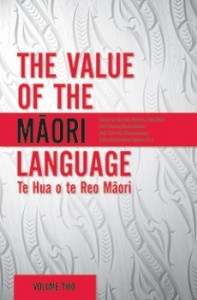
Rawinia Higgins, Poia Rewi and Vincent Olsen-Reeder, The value of the Māori Language: Te Hua o te Reo Māori (Wellington: Huia, 2014). Associate Professor Poia Rewi is currently the Dean of Te Tumu and Professor Rawinia Higgins, a former Te Tumu staff member (now the Head of Te Kawa a Māui, Victoria University), co-edited this volume and co-wrote a chapter on their ZePA model for language revitalization. Also featured are chapters from former Te Tumu staff member, Hana O’Regan, and Katharina Ruckstuhl, a former Te Tumu student and Senior Research Analyst at the Research and Enterprise Office of the University of Otago.
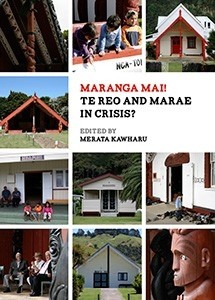 Merata Kawharu, Maranga mai! Te Reo and marae in crisis? (Auckland: Auckland University Press, 2014). Associate Professor Merata Kawharu, an adjunct member of Te Tumu, edited this collection from a number of eminent scholars on the state of te reo Māori and the participation of Māori in marae activities.
Merata Kawharu, Maranga mai! Te Reo and marae in crisis? (Auckland: Auckland University Press, 2014). Associate Professor Merata Kawharu, an adjunct member of Te Tumu, edited this collection from a number of eminent scholars on the state of te reo Māori and the participation of Māori in marae activities.
We wish both Merata and Poia the best of luck in these Awards.

